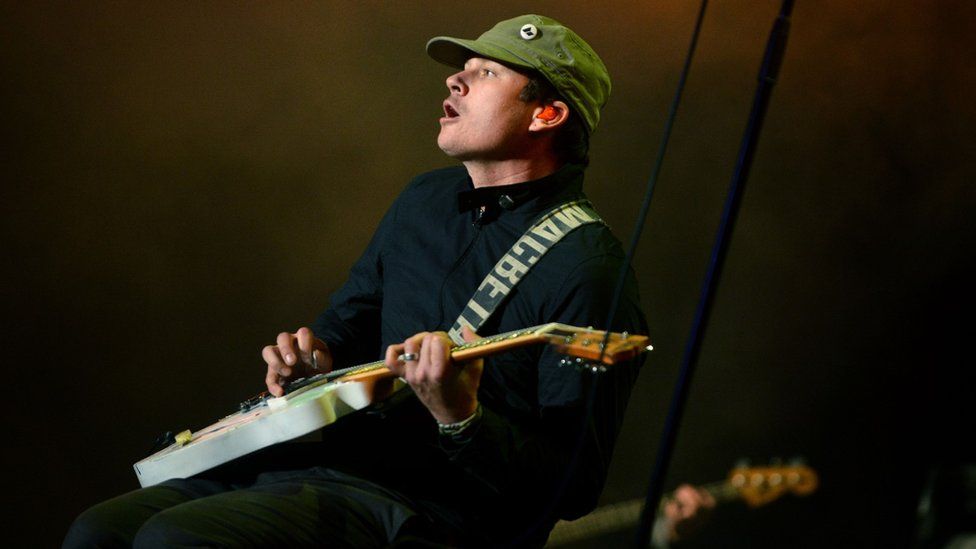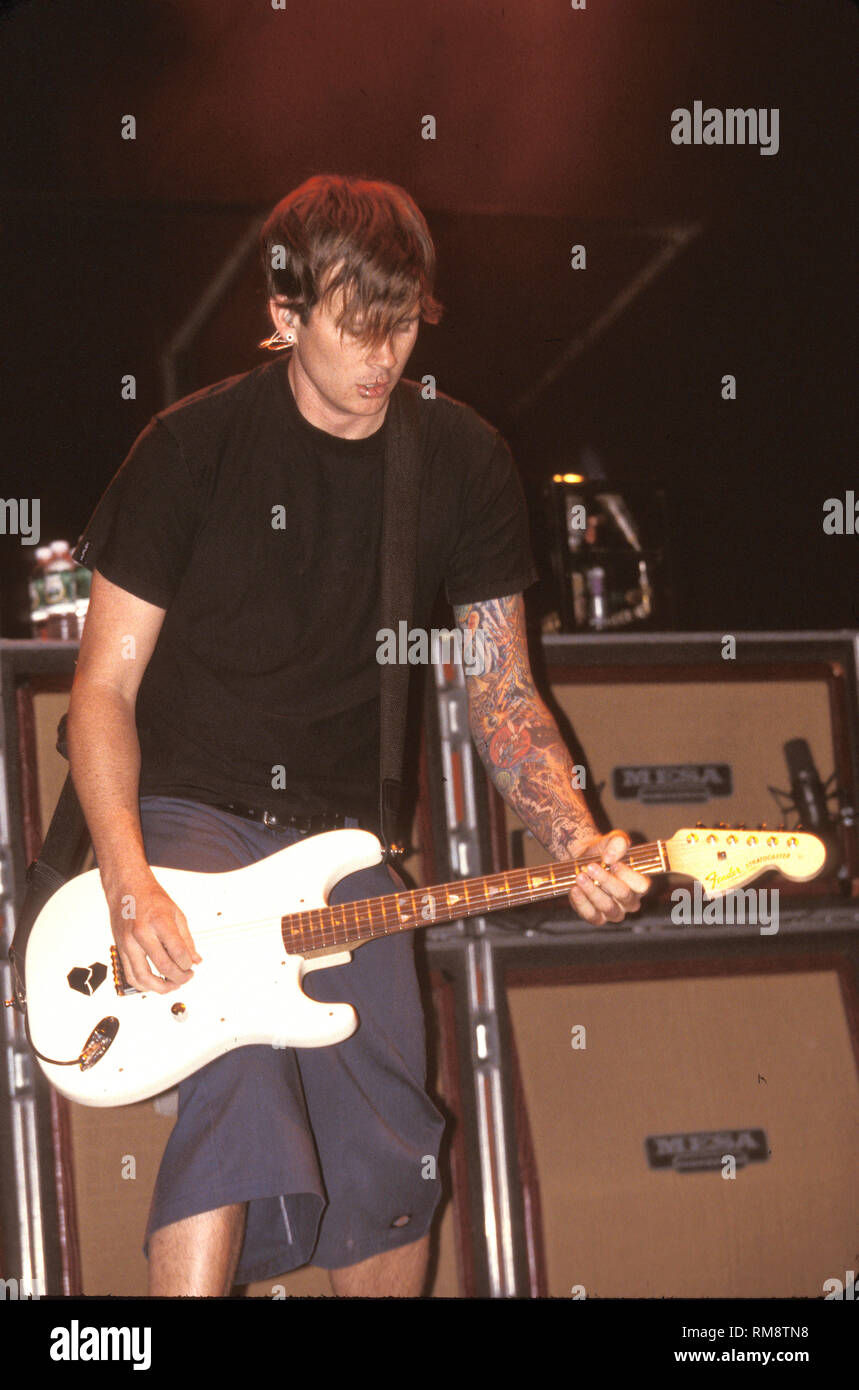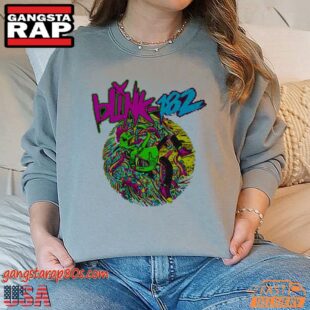No products in the cart.
New
The Ever-Evolving Voice of Blink-182 A Journey Through the Band’s Vocal Landscape
Blink-182, the iconic pop-punk band renowned for their infectious energy, catchy tunes, and sometimes controversial lyrics, has had a complex and fascinating history with their lead vocals. The band’s journey has seen changes in personnel and musical direction, each impacting the sound and persona of the frontman. While the answer to the question “Who is the lead singer of Blink-182?” might seem simple at first glance, delving deeper reveals a rich narrative of shared vocals, shifting styles, and individual artistic growth. In this article, we will explore the evolution of Blink-182’s lead vocals, focusing on the contributions of key members and how their voices have shaped the band’s signature sound over the years.
The Evolution of Blink-182’s Lead Vocals

From its inception in the early 1990s, Blink-182’s vocal landscape has been marked by shifts that reflect not just changes in personnel but also broader trends in punk rock and alternative music. The band began as an underground phenomenon, gaining popularity through energetic live performances and adolescent themes woven into their lyrics. As the band matured, so too did their sound, leading to a more nuanced vocal approach.
The Early Days: Tom DeLonge and Mark Hoppus’ Dynamic Duet
In its early days, Blink-182 was primarily defined by the dual vocal talents of Tom DeLonge and Mark Hoppus. DeLonge’s voice resonated with raw energy and emotional authenticity, while Hoppus’s contributions added a melodic balance, resulting in a distinctive sound that set them apart from their contemporaries. Songs like “Dammit” and “What’s My Age Again?” exemplified this synergy, showcasing how two different vocalists can enhance the overall soundscape.
As the band progressed, DeLonge’s vocals often took the forefront, drawing listeners into his world filled with angst and youthful rebellion. His style was characterized by a blend of aggressive punk and catchy hooks, making it appealing to a broad audience. Hoppus’s lighter, more melodic voice complemented DeLonge’s rawness, creating a harmonious interplay that defined their early albums. This duality became a hallmark of Blink-182’s identity, contributing to their rise as pop-punk icons.
The Transition Period: Changes in Vocal Dynamics
With the release of Blink-182 in 2003, the band began to explore new thematic elements and musical styles. This transition brought about a shift in vocal dynamics, as both DeLonge and Hoppus began experimenting with their vocal delivery. The album showcased a more mature approach, addressing themes of love, heartbreak, and self-reflection. Tracks like “Feeling This” exemplified this growth, featuring intricate vocal harmonies and a blending of their respective styles.
The interplay between DeLonge’s and Hoppus’s vocals became increasingly sophisticated, highlighting their individual strengths while maintaining the essence of their collaborative spirit. However, as the band moved toward darker themes, fans began to notice subtle changes in their delivery—a sign of their evolving artistic vision. This period marked the beginning of a more complex vocal landscape that would continue to develop in subsequent years.
The Impact of Departure: Voice of Change
Tom DeLonge’s departure from Blink-182 in 2005 marked a significant turning point in the band’s vocal trajectory. With the absence of DeLonge’s distinct voice, Hoppus found himself in a position where he needed to step up and redefine the band’s sound. This shift created a vacuum that would lead to new opportunities for Hoppus to showcase his vocal abilities, but it also posed challenges in terms of maintaining the band’s established identity.
During this transitional phase, Hoppus embraced a more prominent role, infusing his baritone voice with newfound emotional depth. Songs like “I Miss You” highlighted his capacity for vulnerability, allowing fans to connect with a different side of his artistry. However, the challenge remained: could the band sustain its momentum without DeLonge’s energetic presence?
Mark Hoppus: From Punk Rock Icon to Solo Artist

Mark Hoppus has always been an essential part of Blink-182’s sound, but after DeLonge’s exit, he became the primary driving force behind the band’s musical direction. This shift allowed him to explore new territories in both songwriting and vocal delivery, as he took on the responsibility of leading the band through uncharted waters.
Embracing New Challenges: Hoppus as Lead Vocalist
With DeLonge stepping back, Hoppus had to stretch his vocal range and emotional delivery in ways he hadn’t before. He adapted his style to take center stage, navigating the complexities of their evolving sound while remaining true to the band’s pop-punk roots. Hoppus’s approach became increasingly introspective, reflecting a maturity that resonated with both long-time fans and newcomers alike.
His work on the album Neighborhoods displayed a willingness to experiment with vocal layering and harmonies. Songs like “Up All Night” and “After Midnight” highlighted Hoppus’s ability to convey emotion through his voice, demonstrating that he was more than capable of shouldering the weight of the band’s legacy. This era marked a pivotal moment in Hoppus’s career and solidified his status as a formidable vocalist in the pop-punk genre.
Collaborations and New Sounds
During this time, Hoppus also engaged in various collaborations outside of Blink-182, allowing him to expand his stylistic range further. These experiences provided fresh perspectives that he carried back into the studio when working on Blink-182’s future projects. By collaborating with different artists, Hoppus enriched his vocal palette, bringing diverse influences into the mix.
This exploration led to notable tracks like “Bored to Death,” where Hoppus’s evolved vocal style harmonized beautifully with DeLonge’s return. Such collaborations demonstrated a more seamless integration of their voices, emphasizing the dynamic interplay that had characterized Blink-182 from the start. Additionally, Hoppus’s willingness to adapt and grow as an artist reinforced the notion that the band’s vocal landscape is ever-changing and multifaceted.
Defining a New Identity
As Hoppus navigated these changes, he began to define a new identity for Blink-182—one that still honored the band’s roots while embracing the evolution of its sound. His leadership during this time emphasized the importance of collaboration, ultimately leading to some of the most memorable vocal moments in the band’s discography.
However, as much as Hoppus emerged in this new role, there remained an undeniable longing for DeLonge’s unique flair. Fans often yearned for the synergy the two had achieved in earlier works, illustrating the emotional connection that the original lineup fostered. This nostalgia underscored the significance of their shared vocal heritage, even amid the changes taking place.
Tom DeLonge’s Departure and the Rise of Matt Skiba

When Tom DeLonge left Blink-182 in 2005, the void he left was palpable. The band quickly welcomed Matt Skiba of Alkaline Trio as the new guitarist and occasional lead vocalist. This decision brought a new layer to the band’s vocal landscape, introducing fans to a fresh sonic perspective while also challenging the existing dynamic.
Introducing Matt Skiba: A Different Flavor
As the frontman of Alkaline Trio, Skiba brought a darker, more brooding aesthetic to Blink-182. His distinct vocal style offered a contrast to Hoppus’s bright melodies, creating a new dynamic that shifted the band’s sound. Songs like “San Diego” and “Teenage Satellites” showcased Skiba’s ability to weave intricate melodies alongside Hoppus, adding an edge that was previously absent.
Skiba’s arrival marked a departure from the playful innocence associated with Blink-182’s earlier work. Instead, it opened the door to explore themes of love, loss, and introspection, all delivered through his unique vocal lens. This tonal shift not only reflected the evolution of the band post-DeLonge but also highlighted the importance of adaptability within the ever-changing landscape of music.
Maintaining the Legacy Amidst Change
Despite Skiba’s contributions, the challenge remained: How could Blink-182 maintain its legacy while ushering in a new era? Hoppus and Barker worked diligently to integrate Skiba’s style into the band’s established sound. This effort culminated in the album California, which served as a testament to the band’s resilience and commitment to preserving its essence.
Tracks like “Bored to Death” saw Hoppus and Skiba sharing vocal duties, creating a harmonious blend that spoke to the band’s collaborative spirit. This combination of familiar and fresh voices struck a chord with audiences, allowing fans to appreciate both the nostalgia of the past and the excitement of the present. The result was an album that not only celebrated their legacy but also paved the way for future explorations.
The Impact of Skiba’s Contributions
Skiba’s influence extended beyond just vocal performance; his songwriting style also resonated deeply within the band’s collective identity. His lyrical approach often delved into darker territory, offering a stark contrast to the carefree attitude prevalent in earlier works. This new approach enabled the band to engage with more complex emotional landscapes while maintaining the catchy hooks that defined their sound.
While some fans initially resisted the changes brought by Skiba, many soon came to embrace the new direction. Skiba’s vocal contributions demonstrated that Blink-182 could evolve while still staying true to its roots. This adaptability underscored the band’s enduring appeal, proving that it was capable of growing alongside its fanbase.
The Impact of Lead Singer Changes on Blink-182’s Sound
The fluctuations in Blink-182’s vocal lineup have inevitably shaped the band’s overall sound, driving multiple creative directions over the years. Each lead vocalist has contributed a unique flavor, resulting in an eclectic body of work that resonates with listeners across generations.
The Ripple Effect of Departures
The departure of a key member always carries consequences, particularly regarding the band’s vocal identity. When DeLonge left, the initial shock reverberated throughout the fanbase, sparking concerns about the future of Blink-182. However, this transition also prompted Hoppus and Barker to reexamine their roles and explore new creative avenues.
This ripple effect extended beyond the band members, influencing their production choices and songwriting processes. They began to experiment with different vocal arrangements, harmonies, and lyrical themes, ultimately leading to a richer and more diverse catalog. The absence of DeLonge challenged Hoppus to step out of his comfort zone, pushing him to explore deeper emotional contexts while also sharpening his vocal prowess.
The Role of Collaboration in Sound Development
Throughout Blink-182’s evolving sound, collaboration has played a vital role in defining their identity. The contributions of each member—be it DeLonge, Hoppus, or Skiba—have melded together to create a unique tapestry of sound. Their ability to share vocal duties has led to captivating moments that resonate with audiences, reinforcing the idea that multiple voices can coexist harmoniously.
Hoppus’s collaboration with Skiba resulted in songs that balanced both members’ distinctive vocal characteristics. The blending of their styles created a sonic depth that highlighted the band’s versatility and commitment to innovation. In doing so, they ensured that neither DeLonge’s nor Skiba’s presence overshadowed the other, allowing the band’s core essence to shine through.
The Lasting Impact of Vocal Evolution
Ultimately, the evolution of Blink-182’s lead vocals speaks to the band’s resilience and adaptability. As the years passed and members changed, the band continued to prioritize collaboration, allowing them to navigate challenging transitions while remaining connected to their roots. This dedication to their craft ensured that Blink-182 maintained its relevance in an ever-evolving music landscape.
The impact of these vocal changes is clear; they have shaped the band’s legacy by demonstrating the power of collaboration and the importance of collective creativity. As each member has added their voice to the mix, the band’s sound has flourished, creating a diverse catalog that speaks to various human experiences.
A Look at the Vocal Styles of Each Blink-182 Lead Singer
Examining the individual vocal styles of Blink-182’s lead singers reveals the nuances that contribute to the band’s distinctive sound. Each member has brought their own flair to the table, shaping the overall experience for listeners.
Tom DeLonge: The Energetic Visionary
DeLonge’s vocal style was a critical component of Blink-182’s early success. Characterized by its raw energy and youthful exuberance, his voice often conveyed a sense of urgency that resonated strongly with fans. DeLonge’s ability to infuse catchy melodies with emotionally charged lyrics created an indelible mark on the band’s sound.
His unique delivery combined punk aggression with pop sensibility, establishing a blueprint for the genre. Songs such as “What’s My Age Again?” and “All the Small Things” exemplified his skill in crafting anthemic choruses while addressing relatable themes of adolescence and rebellion. DeLonge’s vocal signature remains a defining characteristic of Blink-182’s identity.
Mark Hoppus: The Melodic Counterpart
Hoppus’s vocal style offers a contrasting yet complementary tone to DeLonge’s. His baritone voice lends itself to catchy melodies, while his clever lyricism gives depth to the band’s storytelling. Hoppus’s contributions often focus on personal experiences, making his perspective relatable to fans.
Tracks like “I Miss You” and “Adam’s Song” showcase Hoppus’s introspective approach to songwriting. His ability to evoke a feeling of vulnerability and authenticity through his vocals adds a layer of complexity to Blink-182’s discography. As the band navigated transitions and transformations, Hoppus’s steady presence provided cohesion amid uncertainty.
Matt Skiba: The Brooding Influence
When Skiba joined Blink-182, his distinct vocal style introduced a new layer of depth to the band’s sound. Known for his darker and more emotive delivery, Skiba’s voice often explored themes of heartbreak and existentialism. This shift in vocal dynamics added a fresh dimension to the band’s identity.
Songs like “Los Angeles” and “Teenage Satellites” highlighted Skiba’s ability to blend seamlessly with Hoppus’s vocals, showcasing the power of collaboration within the group. His unique flair complemented the established sound while pushing the boundaries of what Blink-182 could achieve. Skiba’s contributions helped solidify the band’s relevance in a changing musical landscape.
The Future of Blink-182’s Lead Vocals
As we look toward the future, the question remains: What awaits Blink-182 in terms of its vocal landscape? With DeLonge’s recent departure and the uncertain state of the band’s lineup, fans are left speculating about the next chapter in their story.
Navigating Uncertainty and Change
Change is a constant theme in Blink-182’s journey, and the current moment is no exception. The band’s success has always relied on its ability to adapt and evolve, so how will they move forward in a post-DeLonge world? Will Hoppus and Barker continue to carry the torch themselves, or will they seek out new collaborators to bring fresh voices into the fold?
The uncertainty surrounding Blink-182’s future may frighten some fans, but it also presents an opportunity for growth. The band has thrived amidst change before, and there’s every reason to believe they can do so again. Exploring new vocal dynamics while honoring their legacy will be crucial as they chart a course for the future.
The Potential for New Voices
The introduction of new voices into Blink-182’s repertoire could usher in exciting possibilities. Collaborating with emerging artists or seasoned musicians could result in a revitalized sound that resonates with both long-time fans and a new generation of listeners. This potential for collaboration reflects the ongoing evolution of the band’s identity and reinforces the concept that change can lead to growth.
Whether it’s through returning to the studio for new recordings or embarking on a tour with guest musicians, Blink-182 has the opportunity to redefine what it means to be a band in the modern era. The evolution of their lead vocals will undoubtedly play a significant role in shaping this narrative.
Looking Ahead: The Legacy Continues
Regardless of who steps into the role of lead vocalist moving forward, one thing is certain: Blink-182’s legacy is firmly entrenched in the hearts of its fans. The band has made significant strides in reshaping the pop-punk landscape, and its commitment to collaboration will remain integral to its sound.
As they navigate the future, the emphasis will likely remain on the collective voices that have come together to create music that resonates with millions. The power of collaboration lies at the heart of Blink-182’s journey, ensuring that their legacy continues to inspire and connect with audiences for years to come.
The question of who the lead singer of Blink-182 truly is doesn’t have a single definitive answer. The band’s sound has been shaped by the collaborative efforts of multiple voices, each contributing a unique flavor to the overall sonic tapestry. While DeLonge and Hoppus might be the most prominent voices, the contributions of Skiba, Barker, and even guest singers have shaped the band’s evolving persona.
Best Blink-182 Gifts For Fans
Buy Now! Blink 182 baseball jersey
Ultimately, the legacy of Blink-182’s voice lies not in a single individual, but in the collective dynamic between its members. The band’s musical journey reflects the power of collaboration, the ebb and flow of creative energy, and the constant evolution of a voice that has touched millions of fans across generations. They are a testament to the fact that the true power of a band lies not in a single frontman, but in the harmonious blend of voices that create a sound truly their own.




















